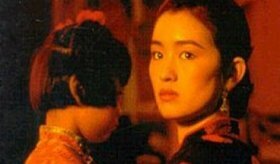|
|
| Tookey's Review |
|
| Pro Reviews |
|
| Mixed Reviews |
|
| Anti Reviews |
|
| Cast |
|
| |
 |
| |
| Released: |
1994 |
| |
|
| Genre: |
DRAMA
FOREIGN
|
| |
|
| Origin: |
China/ Hong Kong |
| |
|
| Length: |
125 |
|
| |
|
| |
|
|
| |
|
|
An indictment of the idiocies of Chinese Communism, Mao-worship and the Cultural Revolution through its story of an ordinary family from the 40s through to the present day.
|
Reviewed by Chris Tookey
|
By the end, the dream of a just, Communist society has dissipated, until it has the status of a fairy story - or a Father Christmas that grown-ups only pretend to believe in.
In the west, a magnificent film like this can win awards, such as the Grand Jury Prize and Best Actor at the Cannes Film Festival. In its country of origin, China, To Live earned its brilliant director, Zhang Yimou, nothing but trouble. He and his leading lady, Gong Li (pictured right), were confined within the borders of the country; his next production was closed down by the authorities; and he was forced to apologize publicly for his political incorrectness.
It is Zhang's achievement that he tells a tale which is essentially tragic with humour, warmth and compassion even for the misguided authorities. The Old Men who run China should have been grateful to him.
To Live is closer in style to drama-documentary than Zhang's most famous films: Red Sorghum, Ju Dou and Raise the Red Lantern. Even so, it is beautifully framed and lit. Zhang marshals his imagery - puppets, water, food, putting on a show - with the precision of a master film-maker.
Unfortunately for its commercial prospects, To Live follows too soon after two Chinese films on a similar scale and theme, Farewell My Concubine and The Blue Kite. But it is more accessible and moving than either; and, if it lacks the anger which made The Blue Kite so powerful, it also manages to be less depressing, by finding something positive in the indomitable spirit of its central family. As the mother and father, Gong Li and Ge You give two of the most moving performances of this, or any, year.
"I believe that for a long time now Chinese films have been too abstract, conceptual, gimmicky. They don't relate at all to the lives of ordinary Chinese people. I'm certain that most audiences will like this film. We haven't gone overboard on the tragic elements, but rather have focused on the minute, amusing details in the life of a nobody. There are tears and laughter, one following the other in a gentle rhythm like the breath of a bellows."
(Zhang Yimou, director)
|
|
|

